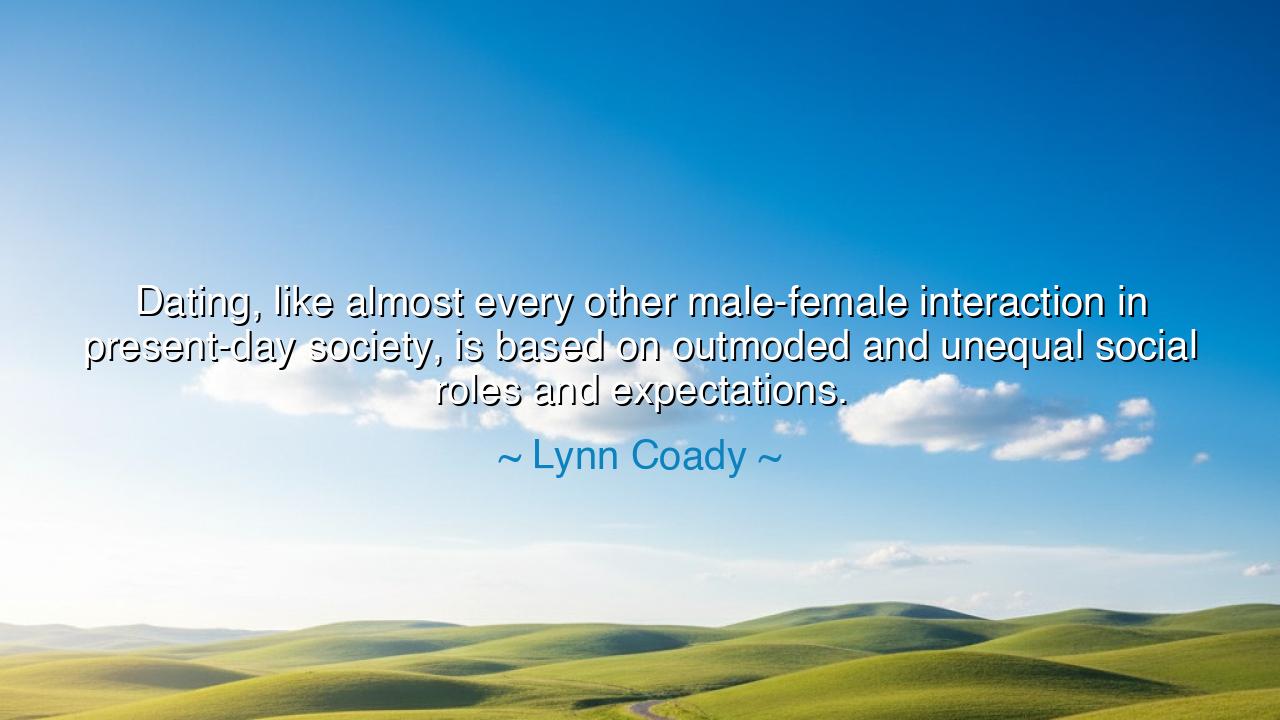
Dating, like almost every other male-female interaction in
Dating, like almost every other male-female interaction in present-day society, is based on outmoded and unequal social roles and expectations.






In the councils of hearth and street, a clear bell sounds: “Dating, like almost every other male-female interaction in present-day society, is based on outmoded and unequal social roles and expectations.” So speaks Lynn Coady, and her saying is both diagnosis and summons. It tells us that many of our tender rituals were cast in older molds—ornate, glittering, and too small for living people. We dress for the banquet of love, yet often sit in chairs carved for ghosts: the gallant who must always pursue, the maiden who must always consent by silence, the ledger of who pays and who is grateful. The sentence asks us to notice the furniture and to choose whether we will keep it.
To call these roles outmoded is not to despise the past but to recognize its seams. Older codes arranged the dance so that grace could be expected—even choreographed—but they also smuggled in a ranking: his desire as destiny, her deference as virtue. When such rules survive beneath new music, the couple moves with a quiet limp. A woman who leads is labeled difficult; a man who listens is mislabeled weak. The script praises romance while disciplining freedom. Thus the line’s hard center: love cannot flourish if it must bow to unequal scaffolding each time it stands.
Consider a story from our own streets. Mira and Joel met under the electric hum of a café. He liked to plan; she liked to improvise. Yet on their first nights out, they found themselves reenacting the old pageant without being asked: he chose and paid; she thanked and yielded. The rhythm felt familiar—then thin. One evening they stopped mid-ritual. “Whose choice is this, truly?” she asked. He confessed relief: the script had kept him from admitting his exhaustion, and her from admitting her wants. They began to rotate the labor of courtship—sometimes he pursuing, sometimes she proposing, both learning to name hunger without apology. Desire grew not because someone won, but because both were allowed to be specific.
History echoes the same lesson in louder rooms. In the Victorian parlor, chaperones guarded reputation while economic dependence arranged attachment; in the mid-century suburbs, the date became a transaction—his car, his wallet, her blush. Even legal frameworks carried the bias: doctrines of coverture, wages counted as “pin money,” marital consent treated as permanent. These were not merely quaint custom; they were social roles hardened into structure. When Coady speaks of present-day society, she warns that remnants remain—code still running in the background, making good men clumsy and good women smaller than their voices.
Yet tradition is not only cage; it is also archive. Within it lie courtesies worth keeping—attentiveness, punctuality, trust built slowly. The work is not to salt the earth but to till it: to separate hospitality from hierarchy, romance from domination. A bow can be beautiful when it honors a person, not a pecking order; an offer to host can be generous when it is answerable, not assumed. The art is to preserve sweetness while dismantling the ladder hidden beneath the tablecloth.
From this, let the lesson be carved plainly. Freedom in love requires mutuality in practice. Replace inherited scripts with explicit agreements: who initiates, who pays, how intimacy is paced, how “no” is heard and honored. Trade performance for presence; ask, “What do you enjoy?” and mean to be changed by the answer. Measure success not by adherence to expectations, but by the growth of safety, honesty, and delight in both hearts.
And let the actions be simple, repeatable, and brave. Share the labor of dating—planning, paying, texting first—by turns or by preference, not by gender. Treat consent as an ongoing conversation, not a threshold crossed once. When you catch an outmoded reflex (“the man must…,” “the woman should…”), name it aloud, laugh gently, and choose differently. Rotate the spotlight: ask as many questions as you answer. Teach your friends and children to read scripts critically and to write their own—with kindness as the meter and equity as the rhyme. Do this, and what was once an unequal dance will become a shared choreography, where two whole people meet without costumes and stay because the steps are honest.






AAdministratorAdministrator
Welcome, honored guests. Please leave a comment, we will respond soon